
The Frame Never Outdid The Picture
Simple Words
The blinding North Dakota blizzard blasted against Elizabeth Irmen as the young schoolteacher and her troupe of students trudged through the knee-deep snow. The lane that led from their rural North Dakota schoolhouse to the main road was already obscured. They had to move quickly before the whirling winds heaped the snow into mountainous drifts. Otherwise, it would be disastrous.
From behind her, came the drone of a truck engine and turning her face into the whipping wind, she saw the welcome sight of headlights approaching. Hastily, she huddled her students off the highway and watched as the huge truck slid to a stop near the spot where the children had been walking only a few moments earlier. The door flew open, and the driver, Walter Ward, called to them through the storm. "Come on, kids! Pile in. I'll get you home."
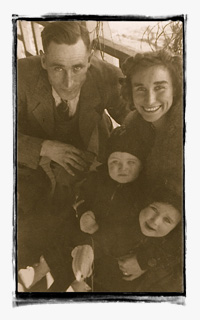
Gratefully, with teeth chattering, the children clambered aboard the warm vehicle. As Walter assisted the children, he asked the teacher, "And where do you live, honey?" It was an innocent question. She was so young he'd mistaken her as one of the students. "Well, honey-" she replied with a twinkle in her eye, "-I just live around the corner. I'm the teacher." It didn't escape her attention that this thoughtful "rescuer" was strong and good-looking. An awkward introduction, but it was a beginning. Walter and Elizabeth fell in love and marriage quickly followed.
Soon their lives revolved almost entirely around children. They had nine of their own. Three of those children - Annie, Nelly, and Matthew - would become the 2nd Chapter of Acts, one of the pioneering groups in contemporary Christian music. Much of what they set in motion continues to influence Christian music today.
To understand the impact of the 2nd Chapter of Acts' music and ministry, it helps to reflect upon how God called them into relationship with Him, how He filled them with His presence, and how He has worked in and through the lives of three shy, unassuming kids from North Dakota. Where did they come from? How did they get to where they are today? What was God saying through them in the '70s and '80s, and what is He saying through them today? Let's go back to the beginning.
The Early Days
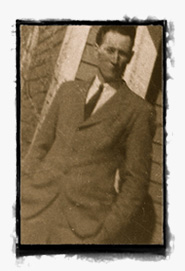
In the 1950’s, Walter Ward worked hard as an itinerant farmer to provide a sparse living for his sprawling family. He was a happy man who loved to dance, sing, and play the harmonica. Though poor, the Wards were rich in love, fun and music. "There were many things we did not have," Annie recalls. "Things such as indoor plumbing and other 'luxuries.' But the one thing we did have was love. No matter what, we always knew Mom and Dad loved us. I never heard my parents argue. They were always very kind to each other, and to us."
Music was a major part of the Wards' life. Annie began singing publicly at five years of age, with her older sister, Kathryn and Stephanie. They performed favorites like, "How Much Is That Doggie in the Window," while their mom accompanied them on piano. "The Ward Sisters" sang for all sorts of rural festivities: farm co-op meetings, the dedication of a new train engine, school openings, and country church picnics.
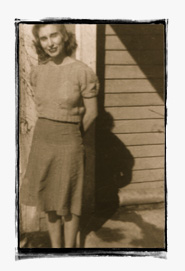
It was late in 1950 that Elizabeth began to complain of chronic headaches and constant physical weakness. Doctors diagnosed her as having epilepsy. Despite their best efforts, Elizabeth's condition grew worse year after year. The family moved to California to be closer to relatives who could help in the face of Elizabeth's deteriorating health.
In 1968, Elizabeth Ward died of a brain tumor. She had been misdiagnosed for more than a decade. Nelly recalls looking at her mom during the funeral and learning an early truth, “When I looked at her body lying there, it was suddenly obvious that the body was not my mother... Only a shell remained.” For Nelly (12 yrs) and Matthew (11yrs), who still remained at home, life became more difficult. Nelly would take on more of the family’s cooking and cleaning duties as Walter tried to continue life without Elizabeth.
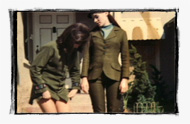
Annie was left reeling at her mother's death. She was dabbling in drugs, searching for the meaning to life in Eastern mysticism and in New Age type religions. Nothing satisfied the inner longings of her heart. The loss of her mother intensified Annie's sense of loneliness and meaninglessness, and it forced her to face the fleeting, fragile, nature of life.
About this time, Annie's boyfriend, Buck Herring, committed his life to Jesus Christ. His new faith was about to make Annie face another confrontation.
A "New" Boyfriend
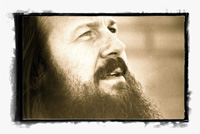
Buck Herring had hopes of steering a rock band into the big-time. One day, while working as a deejay at a Top-40 station, Buck received a frantic phone call from one of his band members. In a panic-stricken voice, he informed Buck that their drug supplier had "gotten religion" and was refusing to deal drugs any more! Buck was intrigued. The dealer told Buck that he'd been "filled with the Spirit," and it was true, there was an undeniable change. To his own amazement, Buck asked if they could go to church together some time. The moment Buck walked into the church, he realized that these people were Spirit-filled, with a capital "S". The worshippers were raising their hands to the Lord singing and speaking praise to him out loud! Oh! No! Buck thought. These people are nuts! As he stood there, fighting an urge to leave, Buck also experienced a powerful stirring in his heart. The searching question came to him: Are you willing to be foolish in your own eyes for My sake? He pondered the implications of this query for less than a minute. Then by a simple act of his will, Buck raised his hands in the air and began to speak words of praise to Jesus.
Shortly after surrendering his life to the Lord, Buck began to sense a conflict between his faith in Christ and the lyrics of the songs that he played as a Top-40 deejay. He resigned his position at the radio station, even though he had no idea where he'd find work.
He also parted company with the rock band. He'd purchased some used recording equipment two years before, in hopes of producing demo tapes of the band. Following his commitment to Christ, he packed up the equipment and donated it all- microphones, tape deck, control board, everything- to the church where he'd given his life to Jesus. As he was packing the equipment, Buck found himself saying out loud: "Father, I would love to produce records for Your kingdom.”
One of the first people Buck wanted to tell about his new commitment to Jesus was Annie Ward. They have been involved with each other previously, but the relationship had soured. By now, Annie was living in Los Angeles, working with a singing group and on the verge of breaking into a successful pop music career. Although she considered herself a "seeker of truth," she really wasn't interested in "Jesus stuff". But since the death of her mom, Annie had continued searching for something to take away the haunting pain and emptiness. For two weeks following his spiritual rebirth, Buck prayed for Annie regularly-not about a potential relationship, but out of concern for the fact that she was lost without Christ. One day, he sensed the Lord saying, "Go find her." He drove to LA and eventually, found Annie living with the members of her singing group at the home of a famous songwriter, who was hoping to launch the group onto the charts. Buck zealously shared his newfound faith with Annie. He briefly told her that she needed to be "born again." Although Annie didn't understand what he meant, she was willing to listen.
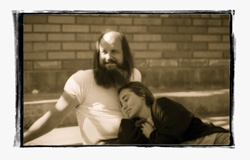
He also thrust into her hands a copy of the Modern English New Testament, Good News for Modern Man. "Read this," he said. And after praying, he left her stunned.
For more than a week, the book remained untouched. But there was something about Buck's prayer…Annie felt as if something profound was happening deep within. Nothing in her life seemed worthwhile- not the drugs, not even the promise of fame.
Several days after Buck's visit, Annie finally picked up the book he'd left and decided to read it-from the back! The Book of Revelation, amazingly, made sense to her. Perhaps it was the sense of majesty she'd felt as a little girl, but she saw Jesus for who He is-King of Kings and Lord of Lords!
Still pondering this Jesus of Revelation, Annie sat down at the piano and started fooling with the keys. She didn't really know how to play, but as a child she'd learned a few basics by watching her mother play. To her surprise, she began playing and the words to a song rushed in. Puzzled, Annie stared at the keyboard. Okay, she thought. This song did not come from me. Where did this song come from? In her mind's eye, she pictured Jesus. He was walking toward her, and Annie had the conviction that the song had come from Him. What did this mean? Then Jesus spoke to Annie and His words seared into her heart: The only thing I am asking of you is to give your life to Me and let Me live through you.
The Wild Weekend
The next time Annie saw Buck, something was different about him. She was fascinated when he explained that he'd been filled with the Holy Spirit. What kind of spiritual power could change a guy like Buck? She wondered. That night, Buck asked if he could pray for her. When she consented, he took her hand, and prayed a simple prayer.
The next morning, when Annie got up, she knew she had two items of business to take care of: She quit the singing group, and committed her life to Jesus Christ. Annie's commitment to Christ was total, even though it meant losing all that she had ever wanted in the music business. "Nobody told me that I had to quit everything in order to become a Christian," Annie recalls. "Once I had made a decision to follow Christ, it seemed like the only logical choice. It was so clear: I could choose everything that I thought I ever wanted…or I could choose Jesus." That night, Buck and Annie went to the home of some folks Buck knew, "Jesus people” who claimed to be filled with the Holy Spirit. Annie wanted the same Spirit that had changed Buck to fill her life. A group of "Jesus people" gathered around Annie as she sat on a chair in the center of the group. They began praying for her and singing in the Spirit. Suddenly, Annie experienced a vision of heaven. She describes it like this:
"There was a myriad of people around the throne of God. The dimension was different than anything I had ever seen in this world. I saw myself in front of the twenty-four elders - though I didn't know who or what they were then. I smelled the incense around the altar. I sensed incredible power…
Suddenly, I saw Jesus. I loved Him so much! I started toward Him, to kiss Him, but I stopped short. Every sin I'd ever committed seemed so real. I just stood there. I could not touch Him. I couldn't touch Him because of my dirt, my filth, and my sin. Instantly-without ever being taught this-I knew that there was no way that I could ever earn His good favor. There was nothing I could do on my own in order to be acceptable in His sight. I was covered with sin and I kept thinking, ‘How could He love me?’"
To everyone's surprise, Annie bolted from the room. Outside, she ran into an open field, where she sat down and wept. She recalls, "I felt God could never love me, because I had disobeyed Him and hurt Him so deeply."
At home that night, she fell asleep still asking, "How could He love me? How could He love me?" Somehow, during the night, something changed inside. "The Lord ministered to me so beautifully and gently, that I woke up asking, 'How could He love me so much?'" The next night, Buck and Annie attended a Bible study and prayer meeting where the leader asked them to stand and give a testimony. Buck shared a few facts about his and Annie's spiritual journey. "All I know," said Annie, when it was her turn, "is that I love Jesus. And Jesus loves me." It was her first public testimony. Simple words of a new faith.
Simple Faith
It was a simple wedding, held in a backyard with only a few people attending. Buck and Annie married in February of 1969. Annie made her own Irish-linen wedding gown, with white embroidered crosses on the sleeves. Annie's sister Kathryn was the Maid of Honor, and Buck's friend Noel Paul Stookey (from Peter, Paul and Mary) was the best man.
The newlyweds became part of an informal prayer group that met regularly on Tuesday nights. They had no pastor or teacher to lead them, so the group shared a meal, sang, discussed scripture and prayed for each other. It was a fresh, free, spontaneous and energetic form of worship.
Trouble At Home
In the summer of 1970, the Ward family suffered a serious blow. Two years earlier, as the grieving family stood around Elizabeth Ward's gravesite, Annie's dad had told her, "In two years time, I'll be right beside her." Nearly two years to the day, he died of leukemia.
Annie had visited him prior to his death, and as he sat up in bed, racked with pain, Walter Ward prayed to receive Jesus Christ as his Savior. Then in his first act as a newborn Christian, this warm and loving man prayed for the salvation of his family. He could not have imagined how his prayer would be answered.
Following their father's funeral, the family agreed that the four youngest children should move in with their older brothers and sisters. Nelly and Matthew were faced with the difficult decision as to where to go. “You decide for us,” Matthew said as Nelly struggled with the choice.
Nelly remembers, “It was difficult choice, because moving to Los Angeles meant I was leaving other siblings.” Jack and Tony went to live with Annie's oldest brother Irmen. Nelly and Matthew, who were 14 and 12 at the time, decided to move in with Buck and Annie, so they made the trip from Sacramento to their new surroundings in Los Angeles. The Herrings had been married for less than a year-and-a-half. The trauma of losing both their parents, combined with the pressures of being thrust into an "instant" family, took its toll on both the Wards and the Herrings. Life wouldn’t be easy.
From Nelly and Matthew's perspective, Annie had moved away from home while they were small children. Now there are put in a situation of living together with the 23-year-old sister they hardly knew. And her new husband was a big, brusque, bear of a man whom they’d only just met.
“I think we were both numb,” say Matthew of the decision to live with the Herrings. "We had just buried Dad, and it really didn't matter after that… It didn't make any difference where we moved."
Buck and Annie, however, had been praying for Matthew and Nelly long before their father's death. Their welcome was a foregone conclusion. Although they had little money to provide for Nelly and Matthew, the Herrings were excited.
At first, Buck and Matthew weren't so certain. Buck was a strict disciplinarian, "verging on legalism." Matthew possessed an incredibly quick wit, and Buck too-often mistook his comments for insubordination. Actually, Matthew was merely relating in the only manner he knew. Buck and Matthew's conflicting personalities made for a volatile mix. Buck's sternness with Matthew negatively affected Nelly, as well. After all, Matt was her brother; she barely knew the brute that was badgering him. Her compassionate spirit caused her to rise up in sympathy for Matthew, while she inwardly bristled at Buck for being so overbearing.
Nelly and Matthew, as well as Annie and Buck, are quick to credit "the grace of God and the lubricating oil of the Holy Spirit" as their secret to surviving these family frictions. Moreover, the tensions began to ease after both Nelly and Matthew came into a personal relationship with Christ. Still, Buck was often baffled in his attempts to discipline Matthew. "I made innumerable mistakes in my early dealings with Matthew," recalls Buck. "Finally, I told the Lord this was obviously not working, and He gave me some wisdom in what to do." The turning point in their relationship came when Matthew brought home a series of pink slips from school, indicating the he'd disrupted the class. Spanking failed, and Buck felt at wit's end. "How am I ever going to get through to this kid?" he lamented. He needed a new approach, and he prayed for wisdom.
After praying, he took Matthew outside the house and drew a three-foot by six-foot rectangle on the ground. "I want you to dig a hole here," he pointed to the rectangle, "six feet deep." Matthew was shocked, but dutifully he began digging. Years later, Matthew recalls, "I thought of running away, but where would I go? I didn't have anywhere to go, and I didn't have any money. So I stayed there and dug." As Matthew was digging, the Lord revealed to Buck that the hole was to be a grave. Finally, Matthew finished. Buck inspected the plot and said, "You've done a good job. Now to into your room and write on a piece of paper all the things you want to fix in your life. I don't want to see the paper. I don't need to know what's on it. It's between you and the Lord. Then bring it out, and I'll help you bury it." Matthew retreated to his room to write his "spiritual obituary". Half an hour later, he and Buck shoveled dirt back into the hole, burying the paper. It was the beginning a healing process in their relationship.
The Gift of Music
One day, Annie sat on a piano stool in front of her piano she named "Brother Bear", wishing she could have learned to play when she was a child. With nine siblings, lessons were a luxury the family could ill afford. The best she could manage was to fool with the keys. And then, to her amazement Annie found herself playing a melody. But how? 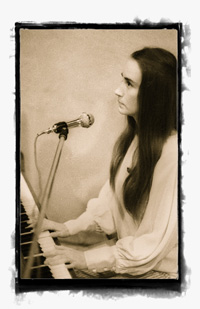 The chords and notes flowed out, as if the Lord was literally giving her a gift of music. "At first," says Annie, "I'd get these beautiful melodies and I'd ask Buck to write the lyrics to go with them." One day, Buck replied, "Annie, don't think about writing a song- just sing whatever's in your heart." It was this encouragement that opened the way to Annie's simple, and deeply intimate songs of praise and adoration.
The chords and notes flowed out, as if the Lord was literally giving her a gift of music. "At first," says Annie, "I'd get these beautiful melodies and I'd ask Buck to write the lyrics to go with them." One day, Buck replied, "Annie, don't think about writing a song- just sing whatever's in your heart." It was this encouragement that opened the way to Annie's simple, and deeply intimate songs of praise and adoration.
When Nelly and Matthew came to live with Buck and Annie, they discovered a comfort and closeness in joining Annie around the piano after school. Their familial voices blended together in spontaneous, smooth harmonies, so tight, so natural. Was it just that the Ward kids had similar genes or was there another explanation? Matthew offers: "I used to listen to a lot of AM radio when I was a kid, and I learned to do harmony by singing a different note than the guy on the radio. I'd sing with everything. I'd even sing with Mom's vacuum cleaner as it whirred back and forth across the carpet, changing its pitch. I'd harmonize with anything that oscillated-washing machines, or whatever. You could say I learned to sing harmony from household appliances!"
In addition to Annie's special gift and Matthew's offbeat vocalizing, Nelly possessed an amazing ability to find the missing notes between her brother and sister. When this trio sang together, their sound was almost angelic. When they first started singing together, it became obvious to the trio that there was something special. “Because we were brother and sisters, our vocal blend was very close and created a unique sound,” Nelly explains.
The Wards never intended to become a professional singing group. "We were just singing to the Lord," says Matthew. "It was a way of releasing our pain. We had gone through something tragic but we knew there was a light at the end of the tunnel." Annie agrees, "When we started singing together, there was such a healing, such a joy in our hearts, that we didn't want to take it outside of our own living room. It was a healing balm to us. Precious. Personal. Something that was ours." It would seem however, that the Lord had other plans.
A Fresh Start
One day as Annie, Nelly and Matthew were singing around the piano, they stopped to pray, which was a regular practice. As they prayed that day, they sensed there was something new and different. As Annie remembers: "He said we were three small streams, but when we came together to sing we would be a mighty river. That river would uproot things in people's hearts that had been buried—the way that rushing water uproots things-and cleans things out, and opens things up. He promised that we would sing as one voice."
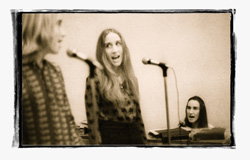
Yet, the trio remained shy about performing in public. They sang in church when called upon, and in local Christian coffeehouses at the insistence of friends. But that was the limit. "The last thing we wanted to do was to sing in front of people," explains Annie. "We never thought 'Oh, boy! Let's get out there and do concerts!' It was always, 'Oh no! We've got to go out there'. We felt that way throughout our years of ministry together. We were scared, shy, and very aware of our inadequacies. The good part was that it forced us to rely upon the Lord."
About this time, Eddie Overstreet, the Herrings’ former housemate, wanted to record a song he'd written. Buck arranged for some excellent studio musicians, most of who were friends, and they went into the studio to record the music track for a song titled, "Jesus Is." The track turned out so well that Eddie felt it was beyond his own vocal ability, and he agreed with Buck that they should find someone else to sing the song - but who?
Buck played the track for a number of their friends and all agreed that it was a "fun, happening" song. But who could they get to sing it? "Why don't we have Matthew sing it!" On Matthew's 13th birthday, Matthew recorded the lead vocal. Annie and Nelly sang background vocals along with many of their friends. It was a "fun" song, and eventually it caught the attention of Pat Boone, who arranged a contract with MGM Records for the release of "Jesus Is" which would later become a Top10 hit on California secular radio. In 1972, the family's recording career was officially born.
What Kind of Name Is That?
While working in the recording studio, editing a secular commercial, Buck heard a phrase go through his mind: The 2nd Chapter of Acts. Later, he described it as "the nearest I've ever come to hearing God speak in an audible voice”. "It wasn't like I should go read this chapter," says Buck. "It was clearly to be the group's name." "I had read that passage of Scripture before, but I didn't have a good idea of what it was about. I didn't want to forget it, so I took a studio grease pencil and wrote The 2nd Chapter of Acts on the front of the tape machine." Buck couldn't wait to get home from work that night to share the name with the family. Their reaction, however, was somewhat less than enthusiastic. "What?" they chorused. "What kind of a name is that?"
"That's an awful name," Annie lamented. "It doesn't even let anyone know we're a family."
Matthew objected, "People will think we are a play!"
Buck responded, "Okay, go get your Bibles and go to your rooms and let's all read Acts, chapter two. Ask God about it. Then come back and let's meet together in fifteen or twenty minutes."
The family spread throughout the big house and began to study the passage. When they reappeared, their response was one of resignation rather than overwhelming enthusiasm. They reluctantly agreed, "Okay, if that's what we're supposed to be, that's it. We'll be the 2nd Chapter of Acts."
Over the years, the name proved to be both a blessing and an obstacle. True, it had a fresh, contemporary sound. But it also barred them from singing for some of the largest, mainline denominations in America. "People were afraid we'd come in and start speaking in tongues or something," laughs Buck. "From our viewpoint, being called The 2nd Chapter of Acts didn't have anything to do with speaking in tongues, or being filled with the Holy Spirit, or any other phenomena commonly perceived as 'Charismatic’, but it occurred to us, that if you were cast adrift and you had only Acts 2, you'd have it all. The prophecy of Jesus' coming, the fulfillment of the prophecy, the outpouring of the Holy Spirit, the birth of the Church, the activity of the early Church as it began to function…It's all there in one chapter. It's the Reader's Digest version of the Bible. "It was never a banner we were waving, concerning the baptism of the Holy Spirit. It was meant to portray the whole life and ministry of the Church. And that's what we felt we were about."
If their new identity felt awkward to Annie, Nelly and Matthew, it was soon to become a household name to millions of Christian music lovers.
Seeds of Ministry
By the time Barry McGuire met The 2nd Chapter of Acts, he had tasted the best and the worst of the music business. His music had taken his group, The New Christy Minstrels, and their idyllic ballad Green Green to the top of the charts. And then his career skyrocketed with the 1965 solo hit, Eve of Destruction. Unfortunately, Barry's personal life was also on the precipice of destruction during this time. As John Phillips of the Mama’s and Papa’s song lyrics went.. "McGuinn and McGuire still a-getting higher in L.A., you know where that’s at.”
Barry later described his life as a "triple-X-rated horror story," filled with alcohol and drugs. McGuire dropped out of the music scene, and spent the next two years with the Agape Force, a group of Jesus People who helped him become established in the Lord. Soon, with new songs to sing Barry began looking for a producer to help record the best, Christ-honoring album possible. His search boiled down to two individuals: one, a highly successful secular producer; the other Buck Herring. Though he became a respected studio engineer, Buck had yet to produce an album. Barry prayed, and then called him.
Buck invited Barry to bring some songs over to the big house in Hollywood. After a few brief formalities, Barry explained how he felt that God had led him to seek Buck's help in producing his next album. Buck asked Barry if he could hear some of the songs and Barry gladly got out his guitar and began singing. Laughing, Buck recollects, "When Barry started singing, the house shook! He was banging his guitar and thumping out the beat with his foot as he sang, 'I don't know what you come to do, but I come to praise the Lord!’ It was great."
Before long, two pairs of eyes peeked around the corner of the stairway. To Nelly, Barry was larger than life. “He was boisterous and though his outwardly appearance was rugged, he was warm and very inviting.”
Buck motioned for Nelly and Matthew to come down, as Barry sang several more songs. When Barry finished, Buck suggested, "Now that Matthew and Nelly are awake, why don't you guys sing a song for Barry?" Barry later confessed that he expected the worst. What have I gotten into? He thought. Now this little family is going to sing. Another can-we-have-our-kids-sing-for-you? How many times have I heard that line before? But as he looked at the skinny, bashful kids gathering around the beat-up piano, he though, "Well, praise the Lord anyway." He settled into a chair and attempted to appear as interested as possible.
Annie, Nelly and Matthew began to sing. Barry was stunned. He'd listened to thousands of singers, but he'd never heard anything like this before! Crystal clear harmonies. Lyrics that sounded inspired in heaven. When the trio finished, tears were streaming down his face. That night, Barry invited them to sing background vocals on his new album. Seeds, was one of the groundbreaking recordings in contemporary Christian music.
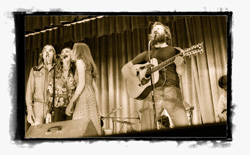
Besides working together on the album, 2nd Chapter of Acts and Barry McGuire agreed to do a series of concerts. The logical place to start was Sacramento, where Buck had been a popular radio personality. It was also there the Acts achieved moderate success, as their second MGM single I'm So Happy soared into the top five on the local charts. And of course, Barry was still well known because of his secular hits. Though they had felt the concert was sure to succeed, they, in fact, lost money. Nevertheless, it was the start of something bigger.
Divine Appointments
In order to have enough material to do their part of the concert, Acts had to hire some musicians and rehearse a few songs. Annie had written several new songs and some members of the band suggested to Buck that they record them. Buck shrugged, "I don't have any money." When the band insisted, the whole troupe went into a studio. This recording session gave us some of the 2nd Chapter's first classics-including Love, Peace, Joy, I Fall In Love, and Going Home. One song from this session seemed to have a special quality. Annie had titled it, Easter Song. Easter Song was one of those that "just came out". Annie recalls, "At first, I didn't think it was much of a song. I loved it, but I didn't think it was a song for us. I thought it was a choir song. I even said to the Lord, 'Oh Father, that sounds like a song that a lot of people should sing.' I was talking with our friends Jimmy and Carol Owens one day. We had been on tour with them in 'Come Together,' a musical they'd written. I thought Jimmy might be interested and I said, 'I have this little song. You might not even like it.’"
When Annie played Easter Song, Jimmy Owens was jubilant. "You don't want to give that song to anybody. You need to record it!" Teeming with confidence, Annie took the song to the band members who, at first, did not share Jimmy's enthusiasm. Drummer, David Kemper whined, "I don't hear any drums on that song. I just can't hear it."
"David!" Buck's voice boomed. "You don't hear any drums on it? Just play! Play something. Do it!" David did. He sat down and put a different drum pattern to the song, taking it out of the choir realm where Annie had first heard it and pulling it into a lilting rhythm that not only 2nd Chapter could sing, but also the whole world could sing.
The song was to undergo a transformation from the way Annie first heard it. Drummer David Kemper added a rhythm and eventually Michael Omartian, another friend of the family, added the lively keyboard track that made the song unforgettable. Omartian's involvement on Easter Song began a long-term relationship. Throughout the early years of Acts ministry, Annie roughed out the songs, and Michael wrote the charts for the musicians before going into the studio. Buck once said, "When the Lord gives Annie a song, it's like a rough-hewn diamond, dug out of the ground. We give it to Michael, and he cuts it and polishes it and puts it in the right piece of jewelry." In Annie's estimation, "Michael is such a musical genius. He has perfect pitch, and the ability to play almost any instrument. He's really a virtuoso, and compared to him I could hardly play at all. Back then he'd get so tickled at me. He'd say, 'This song is wrong. You're not supposed to be able to do these chords. But I love it! It's wrong, but it's great.' He'd also say, 'You play the piano wrong, too. It's wrong, but it's fine… How do you do that?'"
Another person who was impressed by Easter Song was record executive, Billy Ray Hearn. Hearn had begun Myrrh, a new contemporary Christian record label owned by Word. When he first heard Easter Song he said, "Now that's what Christian music is supposed to sound like!"
Growing Pains
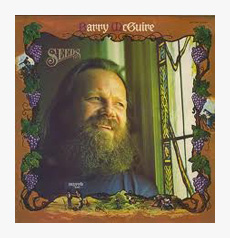
When Buck sent a copy of the newly recorded Seeds album to Billy Ray Hearn, he immediately recognized the record's enormous potential. When Billy Ray came out to the Herring home to discuss the deal, Buck played him some of the songs that 2nd Chapter had been working on. One of those songs was Easter Song.
Because of the difficulties Acts had experienced in doing Christian music for a secular record company, Buck had obtained their release from MGM. Within a few months, Hearn had signed them to do their first album for Myrrh. The 2nd Chapter of Acts and Barry McGuire continued touring together, which was both exhilarating and frightening for the inexperienced trio.
Another factor that contributed to Acts early inhibitions was audience response. During Barry's set, the audience sang along, clapped and cheered. When 2nd Chapter began singing - Going Home was the opener - the audience grew strangely silent. "We thought everybody had gone home!" Annie jokes. "That would really have shaken our confidence, if we'd had any." Several concerts into the tour, somebody approached Annie and said, "We're really sorry we didn't applaud, but we've never heard music like that before!" Many others expressed that they had never before experienced worship so keenly. As Nelly reflects: "One of the reasons people didn't applaud was because we weren't singing songs about Jesus, we were singing to Him. When people recognized that, they sensed His Spirit. They could see Jesus, and they fell in love with Him."
Despite the awkward beginnings, Acts and Barry McGuire continued to tour together intermittently for three years. Through his example, Barry taught the group how to communicate with an audience. "Just be yourselves," he'd encourage them. "Be who God has called you to be." Barry's words fell upon fertile soil. "He taught us so much," says Annie. "He's the best communicator I've ever known."
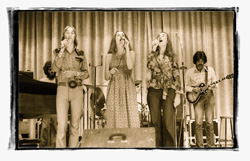
Besides the spiritual power of their music, other factors catapulted Acts into the public spotlight. First, touring with Barry exposed them to a built-in audience each concert. Second, Easter Song was getting airplay on secular radio stations as well as the few contemporary Christian programs that existed them. Too, their album, With Footnotes had taken off. By 1973, they entered the music ministry full-time. For the next twenty years, they would travel across America, Canada, New Zealand, Australia, and Western Europe singing about Jesus.
Bringing the Band Together
Early on, Acts felt the need to have their own band. Nelly's close friend, Jamie Owens told them about a group of musicians at Church on the Way in Van Nuys. "They practice a lot," said Jamie. "But sometimes they don't even play-they just pray." That was good enough for Buck. He approached the band and asked them to pray about working with 2nd Chapter. "We already have," they responded. "And the answer is 'Yes!'" 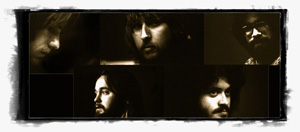
The result was a joining of forces between Acts and A Band Called David. Perhaps the one person who influenced the Acts more profoundly than anyone else was the unassuming pastor of Church on the Way, Jack Hayford. The group began attending Church on the Way when the congregation was less than one hundred strong. (Today, the congregation numbers in the thousands.) "He helped us understand who we are, how to minister, and how to order our priorities," says Buck. "Jack Hayford taught us principles of spiritual integrity, and how to avoid trouble." The 2nd Chapter of Acts and A Band Called David continued to tour together until the end of 1975. Then change was in the wind.
In 1976 The 2nd Chapter of Acts arrived at a crossroads: "Should we or should we not continue?" was the question. Prior to this, the ministry of Acts had grown out of the family relationships. Now, however, as they approached adulthood, Nelly and Matt felt it was time to discern what God's will and call involved for themselves. They were no longer just family; they had become The 2nd Chapter of Acts. As Nelly explains, "It got to the point where we didn't know if we were The 2nd Chapter of Acts, or if Acts was us. We were almost becoming a machine. The ministry was taking over the family, instead of being an extension of the family. “
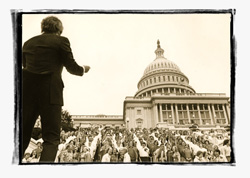
Consequently, Acts took time off to seek God, to grow in their relationships with each other and to clarify the call upon their lives. This did not mean sitting idle, though. For several weeks, Nelly and Matthew toured as part of Jimmy and Carol Owens's popular, bicentennial musical, If My People tour, which focused on calling the nation to prayer. After three weeks on the road, Buck returned home to produce Phil Keaggy's album, Love Broke Through.
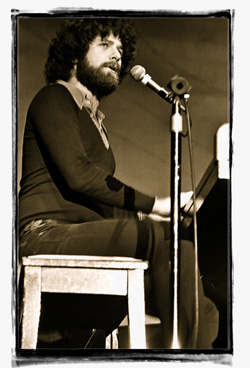
It was during the '76 sabbatical that Acts met another singer-songwriter who would profoundly influence their lives. Keith Green and Acts met while working together on a Terry Talbot album. Their friendship blossomed when Keith came to Matthew's birthday party at the Herrings’ new home in Burbank, California. Buck recalls, "We had a rented harpsichord in the living room, and an antique, grand piano in the bedroom. Keith sat down at the harpsichord and began praising the Lord with some of his high-energy music. Before long, the whole party started doing a sort of spiritual 'bunny-hop,' winding around the room. The line danced out the sliding doors of our living room, across the patio, then in through the sliding doors of our bedroom, down the hallway and back into the living room. Keith was playing in the living room, but as soon as the group would go through the sliding doors, he'd jump off the stool, race to the bedroom, and start pounding on the antique piano, just as the group came bouncing through the bedroom doors. He barely missed a measure. That was Keith - high energy.
Back to Work
By the end of the 1976 break, Acts had redefined their ministry. Everyone answered both questions, “Should we continue” and “Do you feel that God has called you to this work” in the affirmative. Furthermore, by taking the year off from touring as a group, they'd learned a number of personal lessons: How to better appreciate each other and how to allow each person freedom to be himself.
Consequently, 1976 marked a major turning point in their ministry. Following their recommitment, Acts went back into the studio to record The Roar of Love. Says Annie, "For the first time we had fun in the studio, and that came from a new sense of freedom and release." Part of the fun could be attributed to the fact that the studio in which they recorded the vocals did not have a window through which Buck could see the singers. Normally, while recording, Matthew loved to "cut up," laughing and goofing off until the second the "Record" mode was triggered. Yet because of his incredible vocal ability, he could still hit his notes. Meanwhile, Annie and Nelly would be convulsing in laughter, and Buck would be fuming in the control room. On The Roar of Love, since Buck couldn't see the singers, he never knew what was going on behind the partition. 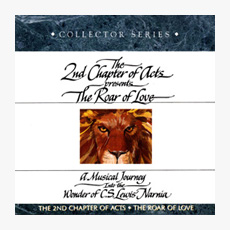 Although the album was completed, the release date of The Roar of Love would be long delayed by contractual and copyright problems. Yet, the detours proved to be providential.
Although the album was completed, the release date of The Roar of Love would be long delayed by contractual and copyright problems. Yet, the detours proved to be providential.
Birds of a Feather
When friend Billy Ray Hearn left Myrrh to begin building new record company Sparrow Records, Acts was among the first of many artists to sign-on. The albums Through a Child's Eyes (Annie's first solo album), Mansion Builder, and The Roar of Love (which they were finally free to release) quickly followed.

Matthew also recorded his first solo album for Sparrow. They intended to title the album Matthew 18, a humorous "take-off" from the name 2nd Chapter of Acts and referring to the fact that Matthew was then eighteen years old. A series of delays held up the album's release, and it was finally re-titled, Toward Eternity.
Despite the delays, Matthew's first solo project produced some outstanding music, including songs like Hold On, It's Alright, Noah's Song, Angels Unaware, and Summer Snow. Several songs on the album were written especially for Matthew by renowned songwriters such as Michael Omartian and Keith Green. Beyond that, the album was the first project on which Matthew enjoyed freedom to experiment with his wide-ranging vocal styles. "Some people say I sound like two different people between the Acts albums and my own solo work," says Matthew. "In a sense, that's true. In the Acts arrangements, I was always singing the third. And, I wrote very little of the material, especially in the early days. On my own projects, I do a lot of different things."
Radical Stands
Because they refused to go with the flow, Acts was often perceived as a radical group. Actually, much of their stance just ran counter to the direction they perceived Christian music to be heading, toward commercialism and to a focus on Christian super-stars. "We created real problems for Sparrow in the early days," Buck recalls. “Because we didn't want to be interviewed by certain magazines, or be on the cover. We didn't want to do anything that smacked of self-promotion. We didn't think it was right to use superlatives, because those drew comparisons. All we wanted our record company to do was to put out the information: The 2nd Chapter of Acts has a new album. That doesn't make it easy for a company to promote a product. I would much prefer the days of our beginnings to what we have now. There wasn't anybody clamoring to do what we did, or what 'Love Song' or any of the other early 'Jesus Music' groups did. There were no charts for us to be number one on. Contemporary Christian music charts didn't exist. I think it's sad that, today, Christian music has become an industry rather than a ministry. I don't really know the answer to this—We used to fight against it continually, and we got ourselves into a lot of hot water. We tried to avoid those things that, in our view, were not edifying to the Body of Christ. Now, we have so many magazines, music charts, and popularity contests, it all has the potential to put ministries in competition with each other, rather than coming alongside and working together for Jesus."
An Acts concert was designed to usher the audience into a worship experience. Annie notes, "We believed God had called us to be a wooer of the Body of Christ, so they could come and be loved by Jesus and be healed."
In the early years, the emphasis was primarily upon evangelism, but then the Lord led Acts into a broader ministry, building up believers. Buck contends, "One of the greatest revelations we received from the Lord was that we were not primarily called to preach people into the Kingdom-although we almost always provided some sort of opportunity to meet Him. In most every concert, people did. But we felt He was telling us simply to let people see Him, and let them enjoy His love, and new believers would be born into the Kingdom of God."
Annual Check-up
Acts sensitivity to the Spirit's leading was not accidental or peripheral. Throughout their ministry, they would gather each January to pray and seek God's priorities for that year's ministry. Annie recalls: "Some years, He'd tell us, 'You are going to be planting. You will be harvesting in three years, but this year you are going to plant.' Another year He'd say, 'This year you are going to be ushering people into the presence of the Holy Spirit,' or "This year is going to be a year of deliverance.'"
One such "word" came to the family during a time of prayer in 1977. They sensed the Lord telling them that, starting in 1978, they should no longer depend upon ticket sales for support of the ministry, but that they were to return to doing "offering only" concerts. God promised that He would meet all of their needs if they would trust Him. This was no small step of faith, considering the enormous expense of putting twelve people and equipment on the road from city to city, plus supporting the group’s members and families. In addition, Acts determined that the offerings should be divided equally between the local concert sponsors and themselves. If a sponsor did not receive enough to pay expenses, 2nd Chapter would take money from their portion of the offering to reimburse the promoter.
That year, every need was met. Acts ministered to more people than ever, their audiences nearly doubled in number, and more people came to know Jesus than in any previous year of their ministry.
Spiritual Battles
Prayer was an important key to Acts’ success. Each morning while on tour, the group gathered in one of their hotel rooms to read a brief passage from the Bible, to share from their hearts, and to pray together. "One of the reasons we did this in the morning was because by the time we got to the concert hall, there was so much to do, too many distractions," Annie says.
Still, when the 2nd Chapter of Acts bus and truck arrived at the auditorium, prayer took priority over unloading. "We'd gather in a circle on stage and pray again. We'd asked for protection, so nobody would get hurt. We'd pray over the auditorium, too, to establish the Kingdom of God there," Annie recounts. "Then right before the concert, we'd have one more short time of prayer-a 'flare prayer' we called it. We'd always invite the stagehands to join us, and many of them did. Some of them came to know Jesus."
On one occasion, Acts was scheduled to minister in a movie theater. The same complex housed several other theaters, in which the owners where showing raunchy films. As Buck recalls, "As was our custom, we took time to seek the Lord before the concert. But as we prayed, we just felt slimy. Then the Lord spoke to us and told us to proclaim the blood of Jesus. We began to pray-loudly, in the name of Jesus, against any evil principalities and powers in that place. That night, the largest number of people to date came to Jesus during the concert."
Texas Transition
In 1981 Acts moved from California to Texas. The group had been seeking some space where they could build homes, as well as a central headquarters for their ministry. Also, they wanted a more central location, so they could redesign their touring schedule, hoping to cover the country in shorter tours. Nelly and her husband Steve, and some of the band members were beginning to have children, so a new touring strategy was needed.
During the summer of 1980, the group visited their friends, Keith and Melody Green at the new headquarters of Last Days Ministries in Lindale, Texas. A piece of property next to Last Days was for sale, and before long the 2nd Chapter of Acts and Last Days were neighbors.
The group had been living in Texas slightly more than a year when tragedy struck. Their good friend, Keith Green, was killed in a plane crash, along with two of the Green's children and nine others. Acts was in New York, ministering at a street crusade with evangelist, David Wilkerson, when they heard the news. "Keith's death rocked us," says Annie. "We all felt our vulnerability like we never had before. We just wanted to wrap our arms around Melody and the others at Last Days, to let them know how much we cared."
Looking back, Buck believes a high standard for all of Christian music was lost at Keith's death. "I think Christian music would certainly be different," Buck says, slowly and quietly, his love for his friend is obvious. "And probably it would be better had Keith not been killed. The music ministers would be better because Keith held up such a high standard. It required everyone else to raise their level of integrity, to measure up."
Annie remembers a softer side of their friend. "In 1981, Buck and I lost a baby because of a tubal pregnancy. It was one of the toughest times of our lives. We had to fly home empty-handed, with heavy hearts. When we deplaned at the airport in Dallas, Keith, Melody and another friend Winkey Pratney were there. They'd brought Keith's bus to pick us up at the airport. When we arrived at our home, there were flowers all over the house, and a huge sign that said Welcome Home!"
Restorative Surgery
In 1983 Acts took a full year off from touring to seek new strength and new direction. This break was far different from the one they'd taken years before. They had no question about continuing as a group; it was a matter of stopping the hectic travel pace long enough for the Lord to do some restorative work.
Although they spent the time at home, 1983 was still a busy year. They built their own recording studio that year. The same morning the studio was finished, Acts began cutting tracts for the album Singer-Sower, which contained songs such as Takin The Easy Way, Spin Your Light, and Room Noise.
For Matthew, 1983 was a very important year; he and Deanne Paul were married in September. For Steve and Nelly Greisen, the rest allowed them time to enjoy parenting their now two boys Andrew and Jesse. As Nelly recalls, her family came to the forefront of her priority list. "The Lord was showing me that He cares about every detail of my life. My ministry to God is not just standing in front of people singing. My ministry to Him is simply to have a heart filled with love and gratitude to Him, expressed in whatever task I'm doing. God is far more concerned about who we are, our character, than what we're doing, far more concerned with our attitudes than our actions. I think wives and mothers especially need to understand this, because we deal so much with the mundane. Being a mother is very important to God and is a high position in His eyes. We are the hand of Jesus to our children. They learn about God by seeing our commitment to Him, lived out in our homes. We can be pillars of strength to our husbands as we help release the gifts God has placed in them. And we do this by being consistent and available with our love."
Motivating Messages
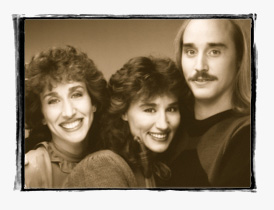
When Acts returned to the road in 1984, they felt revived in every sense. "When we went back out in 1984, we were amazed that the arena of Christian music had changed so much since 1982," says Annie.
For whatever reason, Christian music began to be highly diluted from a spiritual standpoint. And it seemed that the Lord had a distinct message waiting for them. While ministering at an international missions conference in Lausanne, Switzerland, the Lord spoke to the group through the leaders of the gathering. His instructions were clear, and encouraging:
God will give you prophetic words to restore the foundations of holiness and purity in the church and in the world.
Make your plans large - God is your partner!
As you sing, I will bring new life into existence.
Move as one. Keep 'short accounts' with God and with each other.
God will use the group to encourage Christian musicians and to release other musicians in ethics, love, and guidelines.
Keep your eyes open to the 'small people,' stage hands, helpers, and others. Some of your most significant work will be done in these areas.
Pray that God would show you how to give the 'family unit' time. He will provide time for the families.
Each one of these messages had a deeply personal impact upon the members of the 2nd Chapter of Acts. Interestingly, as their ministry moved into its final stages, every word that was revealed proved to be true.
Ending Up
Acts might never have recorded their best-selling album had they not been sensitive to the Holy Spirit's direction. During one of their last tours, three separate individuals approached them in three separate cities. Yet all three had the same message: To consider doing an album of traditional Hymns in the unique vocal style that only Acts could create. "If one person had something such as this," Buck said later. "We may have missed it. But when all three brought the exact message…."
Besides instructing them to produce one of their most inspiring albums, God was providing a financial resource for them in advance. When the last concert was sung, Hymns I & II would continue to sell briskly. Acts was not the first contemporary group to do an album of great hymns from the past. Nevertheless, everyone involved with the project sensed a special anointing upon the Hymns albums. The arrangements were so fresh, so vital, so filled with life, love, praise, worship-and yes, majesty.
All of the songs that Acts recorded had that "special touch," or else they never made it onto an album. "Other than the Narnia album, in which the songs came over a period of five years, we've never written songs specifically for an album,” says Annie. "We never said, 'We've got to do an album. Let's write some songs!' To me, that concept is backwards. That's not why you do an album. Only when you have something to say, only if God has provided the music-then do an album." Nelly agrees, "Recording an album isn't a goal, it is an end result. When I have something I feel that God wants me to say, I'll say it, but not until."
One example of the way such inspiration works is the song, "Fight the Fight," an inspiring anthem that became a rallying cry for the pro-life movement in America. How did it happen? "Melody Green called and asked if we'd sing in Los Angeles for the kick-off of the Walk Across America Campaign in the effort to save unborn babies," says Annie. "We were praying about whether we could attend. Our schedule was already packed full. One day I was sitting at the piano and "Fight the Fight" just came to me. We felt that was a clear indication from the Lord that we should go. Then Steve Greisen suggested a multi-artist project that would eventually involve over 100 Christian artist on the song and a video. The project was produced by Steve and close friend Dan Collins and all of the music artists donated their time to do the record." The message of 'rescue the unborn' would go around the world with artists doing versions in other countries including Holland and Germany
Calling It Quits
When Acts came together in January 1988, to seek the Lord's direction for that year, they were stunned but not surprised by the Lord's instructions to them. The guidance they received was this: "Complete what you have committed to, but don't take anything new. I have other things I want to do with all of you. We'd all felt for a while that a change was coming," says Annie. "There's always a stirring when the Lord is about to do something." Part of that stirring came several months prior to 1988. The words were simple: "I am going to do something new. Do not be afraid."
At first, the members of Acts kept the news of their disbanding within the family. Then slowly, they began to share the information with their closest friends. "Once we understood what we were to do," recalls Buck. "I presented it to Jack Hayford, our pastor and spiritual counselor. Jack confirmed what we were feeling. He said that he'd been feeling the same thing in his heart for some time, as well." Hayford told Buck, "I was excited when you guys were honored with a Dove Award for the Hymns album, because I felt that you would be winding down soon."
When Acts met in January, they had concerts booked through the middle of August 1988. They realized that each concert would be their last in that city. To prevent anyone from thinking that they were attempting to exploit or play upon their public's emotions, they decided to avoid telling their audiences the news until the final tour was close to completion.
Pastor Jack didn't agree. "If you came to my town and I didn't get out to the concert, then later discovered that it was your last concert in my area and I had missed it, I would be extremely disappointed. You owe it to your audience to let them know. Otherwise, it's not fair to all the people who've loved and supported you through the years."
Once the Acts announced their final tour schedule, the response from friends was overwhelming. In every city, they sang to packed auditoriums, and the Spirit of God moved mightily in each concert. "That last time around was unbelievable," says Buck. "Such an incredible amount of love and support was poured out upon us by the Body."
"It was heartbreaking, too," adds Annie, "because we realized that we'd been a part of so many people's lives." While Pastor Jack's reaction to the news of Acts break-up was positive, many others remained unconvinced. "Believe it or not, some people were angry that we were quitting," says Annie demurely. "They'd say, 'This cannot be of God, because when we sang they could still sense the anointing. So they assumed that we should continue. But we knew. Most people who came, though, said, 'Hey, we just want to tell you how much your ministry has meant to us.'"
Nevertheless, knowing that they were doing what God had told them to do did not make the final concert-in Houston, Texas, on August 12-any easier.
As Matthew remembers it: "We finished the concert and the 7500 people attending rose to their feet, and clapped and clapped. Nelly and Annie were crying, and I was losing it. I think it had finally dawned on us: This is our last concert. This is it! We weren't tired of ministering to people or anything. It was just God's time for something new."
Where Are They Now?
All of the members of Acts continue to be active in their own lives. Annie has completed numerous solo albums, and doors have opened for her to have a solo ministry in various churches. "It's an intimate ministry," says Annie. " It's just me out there." Is it difficult to sing without her brother and sister? "Sometimes it is," Annie admits. "I'm so used to them being there. I can hear what they would be singing. Nelly and Matthew have sung backgrounds on some of my albums, though. So in that sense, I still have them out there with me, but I really don't think we'll be doing any more tours together, not unless the Lord tells us to do something."
Ironically, after 20 years of concert ministry, many people do not realize that Annie, Nelly and Matthew are family. People often ask Annie, "Do you know Matthew Ward?" or "Do you know Nelly Greisen?" "Yes," quips Annie.
Moving to Colorado, Nelly and Steve were able to find a new focus. With their boys grown and on their own, Steve’s film production and distribution company Exploration Films / Reel Productions, LLC has thrived and now ships DVD’s all over the world. They love motorcycling in the mountains and scuba diving around the world. They also serve with the nurmerous opportunities that come their way. Nelly stays active in the local community by participating on non-profit boards, singing in worship teams and volunteering. “My greatest pleasure is enjoying hanging out with my two adult boys, and of course, my loving husband Steve.” Their dog Hudson ensures that both Nelly and Steve also enjoy the beautiful Colorado outdoors on a regular basis.
Matthew has also recorded solo albums since Acts retirement and has faced and overcome a bout with cancer and also continues to be involved in full time touring and speaking.
Over the years, Matthew has received several offers for a secular music career, all of which he has refused. "I don't want to sing dead music," he says. "Singing in front of people is the last things that I've ever wanted to do. I was always scared to death, nervous and insecure. But that's probably one of the things that has kept me honest with what I do and not allowed me to get puffed up. Because I realize where I've come from. All the while, I've known that God was calling me to use my gift for Him. I look at it as an honor. Matthew and his wife, Deanne, are also busy parents. They have three delightful daughters: Megin, Morgan, and Mattie.
Simple Words
What was the enduring message that God gave to the Acts to share with the world? "Sometimes we feel like an old record being played over and over again," says Annie. "The message is the same: To see the Body of Christ healed, and to see people's needs met. There is hope in Jesus. There is no situation too great that He cannot take care of."
"All we ever wanted," Buck concludes, "was for people to see Jesus. If anything made us different, it was our fervent desire to please the Lord and to be obedient to Him, regardless of the costs. We only wanted to hear Him say, "Well done, good and faithful servants.”
Some years ago, at the Christian Bookseller's convention, 2nd Chapter of Acts sang three songs and sat down. Their songs brought a sense of worship, holiness and a sense that, in the vehicle of three human voices, Jesus was exalted. To hear Annie, Nelly and Matthew sing of Him, their Risen Lord, was almost to see Him, almost to feel His touch.
Afterwards, a well-known and respected man of God approached them and said of the 2nd Chapter of Acts ministry, "The frame never out-did the picture."
"That was our earnest desire in all we did," Buck finishes. "That the frame would never out-do the picture. And the picture always had to be Jesus."
THE END
If you are interested in obtaining copies of The 2nd Chapter Of Acts music check out our website at 2ndChaperofActs.com.
Home
About
Store
Media
Contact Us

About
History
FAQ

Store
With Footnotes
In the Volume of the Book
How The West Was One
Mansion Builder
The Roar Of Love
Rejoice
Singer Sower
NightLight
Far Away Places
Hymns
Hymns II
Hymns Instrumental
Hymns Collection
20
Very Best Of
DVD Set - First Love







